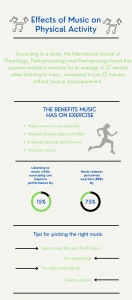by: Emily Lopez
Do you usually listen to music while working out? If so, why? The most common reason to do this is usually because it motivates people throughout their exercises. Listening to music is a great way to start off the day. It can lighten up one’s mood and can also make anything you do much more fun. Music also plays a big role in how well someone performs an exercise or activity, and the time it takes them to complete the exercise.
https://static.independent.co.uk/2021/01/19/15/iStock-1061739512.jpg?width=982&height=726&auto=webp&quality=75
Many people find exercising unenjoyable however, music can turn exercising into something that is fun and enjoyable for everyone. Research shows individuals who listen to music during exercise and physical activity result in better performance than those who do not listen to music. According to a Terry, competitors in a 6-day cycle race traveled 8.5% faster during a military band performance (Terry, 2020). Overtime music has become an important part in many people’s lives. For some it has helped them get through their day dealing with anxiety and depression, and for others music has served as a motivational factor. For example, many people do not find cardio as something they enjoy, specifically running. It can be very challenging and hard to find the motivation to keep going. However, if you add music to your run you will notice that it provides a much more enjoyable experience and time will feel like it is flying.
https://www.mayoclinichealthsystem.org/hometown-health/speaking-of-health/6-tips-for-a-successful-run
There are many different factors that need to be considered when selecting music for better performance. The genre of music as well as the beats and rhythms of a song, influence how well you perform an activity and how fast it takes to complete. Songs that have a fast tempo and are upbeat are great for running to increase pace. Listening to music while exercising provides many benefits such as significantly improving physical performance, increasing oxygen consumption, and reducing perceived exertion (RPE). So next time you go on a run, make sure to bring your earphones!
References
Terry, P. C., Karageorghis, C. I., Curran, M. L., Martin, O. V., & Parsons-Smith, R. (2020). Effects of music in exercise and sport: A meta-analytic review. Psychological Bulletin, 146(2), 91-117. doi:http://dx.doi.org.vortex3.uco.edu/10.1037/bul0000216
Thakare, A. E., Mehrotra, R., & Singh, A. (2017). Effect of music tempo on exercise performance and heart rate among young adults. International journal of physiology, pathophysiology and pharmacology, 9(2), 35–39.
Links to images:


